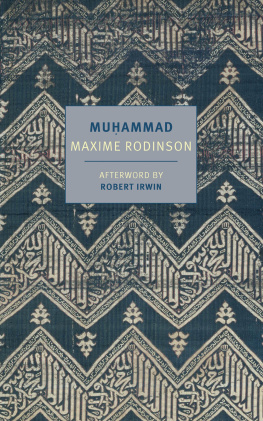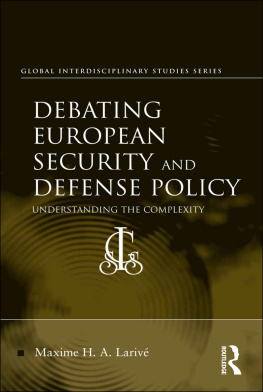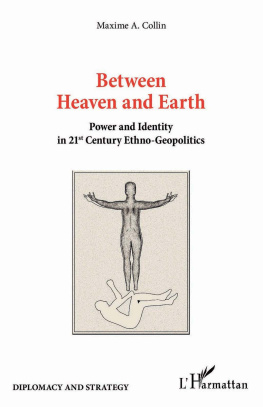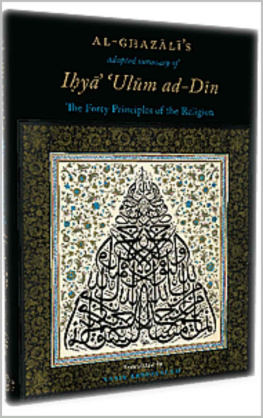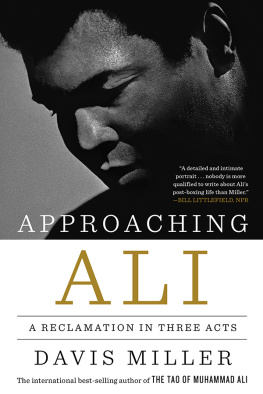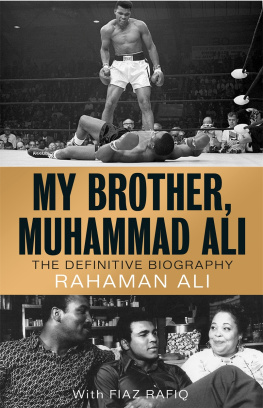Maxime Rodinson - Muhammad
Here you can read online Maxime Rodinson - Muhammad full text of the book (entire story) in english for free. Download pdf and epub, get meaning, cover and reviews about this ebook. year: 2020, publisher: New York Review Books, genre: Religion. Description of the work, (preface) as well as reviews are available. Best literature library LitArk.com created for fans of good reading and offers a wide selection of genres:
Romance novel
Science fiction
Adventure
Detective
Science
History
Home and family
Prose
Art
Politics
Computer
Non-fiction
Religion
Business
Children
Humor
Choose a favorite category and find really read worthwhile books. Enjoy immersion in the world of imagination, feel the emotions of the characters or learn something new for yourself, make an fascinating discovery.
- Book:Muhammad
- Author:
- Publisher:New York Review Books
- Genre:
- Year:2020
- Rating:4 / 5
- Favourites:Add to favourites
- Your mark:
- 80
- 1
- 2
- 3
- 4
- 5
Muhammad: summary, description and annotation
We offer to read an annotation, description, summary or preface (depends on what the author of the book "Muhammad" wrote himself). If you haven't found the necessary information about the book — write in the comments, we will try to find it.
Muhammad — read online for free the complete book (whole text) full work
Below is the text of the book, divided by pages. System saving the place of the last page read, allows you to conveniently read the book "Muhammad" online for free, without having to search again every time where you left off. Put a bookmark, and you can go to the page where you finished reading at any time.
Font size:
Interval:
Bookmark:

MAXIME RODINSON (19152004) was the child of Jewish Communists who fled Tsarist Russia for France at the end of the nineteenth century. Rodinson left school at twelve to support his struggling family by working as an errand boy, but he continued his education in his spare time and in 1932 passed the entrance exam for the cole des Langues Orientales Vivantes in Paris, where he studied Arabic, Turkish, and Amharic in preparation for a diplomatic career. During the Second World War, Rodinson worked for the Institut Franais in Syria and in the French Department of Antiquities in Lebanon, where he remained until 1947; in 1944, he learned of his parents deaths at Auschwitz the year before. Returning to France, he oversaw the Islamic section of the Bibliothque Nationale in Paris. In 1955, Rodinson became the director of studies at the cole Pratique des Hautes tudes at the Sorbonne, where he was subsequently a professor of Old Ethiopic and South Arabian languages, a post he held until his retirement in 1983. He joined the Communist Party in 1937 and was expelled in 1958, in the aftermath of Khrushchevs secret speech denouncing Stalins rule, but remained a Marxist. Among his works are Islam and Capitalism; Marxism and the Muslim World; and Cult, Ghetto, and State: The Persistence of the Jewish Question.
ANNE CARTER has translated various books from the French, including works by Michel Tournier, Charles Perrault, Zo Oldenbourg, Pierre Mends-France, Juliette Benzoni, Philippe Jullian, Pierre Goubert, and Franois Mauriac.
ROBERT IRWIN is the Middle East editor of The Times Literary Supplement and the author of many books, including Ibn Khaldun: An Intellectual Biography. His most recent novel, My Life Is Like a Fairy Tale, was published in 2019, and his tenth novel, The Runes Have Been Cast, will be published in 2021.
MUAMMAD
MAXIME RODINSON
Translated from the French by
ANNE CARTER
Afterword by
ROBERT IRWIN
NEW YORK REVIEW BOOKS

New York
THIS IS A NEW YORK REVIEW BOOK
PUBLISHED BY THE NEW YORK REVIEW OF BOOKS
435 Hudson Street, New York, NY 10014
www.nyrb.com
Copyright 1968, 1994 by ditions du Seuil
Authors foreword and introduction copyright 1980 by Maxime Rodinson
Translation copyright 1971 by Anne Carter
Introduction copyright 2020 by Robert Irwin
All rights reserved.
Originally published in the French language as Mahomet in 1961; second edition published by ditions du Seuil in 1968.
First published by New York Review Books Classics in 2021.
Cover image: Tomb cover with inscription reading There is no god but God. Muammad is the messenger of God, made for the Prophet Muammads tomb in Medina, c. 15171600; photograph Victoria and Albert Museum, London.
Cover design: Katy Homans
Library of Congress Cataloging-in-Publication Data
Names: Rodinson, Maxime, author. | Carter, Anne, translator.
Title: Muhammad / by Maxime Rodinson; translated by Anne Carter; introduction by Robert Irwin. Other titles: Mahomet. English
Description: New York City: New York Review Books, 2021. | Series: New York Review Books classics | Includes bibliographical references and index. | In English; translated from French.
Identifiers: LCCN 2020005805 (print) | LCCN 2020005806 (ebook) | ISBN 9781681374925 (paperback) | ISBN 9781681374932 (ebook) Subjects: LCSH: Muhammad, Prophet, 632Biography. Classification: LCC BP75.13 .R613 2021 (print) | LCC BP75.13 (ebook) | DDC 297.6/3 [B]dc23
LC record available at https://lccn.loc.gov/2020005805
LC ebook record available at https://lccn.loc.gov/2020005806
ISBN 978-1-68137-493-2
v1.0
And not that a man be not sad, but arising before day and biding circumspectly in the communion of an old tree, leaning his chin on the last fading star, he beholds at the end of the fasting sky great things and pure that unfold to delight.
St-John Perse, Anabasis, translated by T. S. Eliot
T HIS book, written around 1960, has often had to be defended. In 1979 the Western public, fairly alarmed by developments in the Islamic world, will undoubtedly expect to learn more from the work than it can reveal. The public deserves a larger explanation, one having to do less, however, with Muammad than with Islam. It is in response to this need that I have written the introductory essay to this edition.
It was necessary as well to justify writing another book on Muammad, there being admittedly no dearth of works, some of them quite good, about the life of the Prophet of Islam. Why another one?
My book does not propose to bring out new facts about the subject. None have been discovered for a long time, and it is unlikely that any will be. Our source material has not grown appreciably; and critical analysis has not advanced since the two remarkable works of W. Montgomery Watt, to which I make frequent reference.
I wished to do something other than a scholarly historical biography, at the same time remaining faithful to the requirements of the historical method. I aimed to write a book that was a narrative account but also an interpretation. The interpretative aspect was of utmost importance to me. I drew on the partial explanations that had already been put forward. I made an effort at times to criticize, refine, or add to them; but above all, I tried to bring them all together, to place them within a wider context, so as to arrive at an explanatory synthesis. Mainly, I was concerned to show how, at a specific historical juncture, the particular psychological make-up of a man combined with the sociological conditions of his time and place to produce a lasting historic impact on a world scale.
Muammad was a remarkable man. I have tried to show how his character and his ideas were formed. I have sought to understand how his personal traits, growing out of his psychological structure and personal history, had prepared him to receive a special Message which he believed to come from the Hereafter, and to comprehend how and why this Message was consonant enough with the needs of his milieu to be received with enthusiasm, first by a small group, then by all of Arabia and beyond. I have attempted to understand, and to make understandable, how and why this mystic, intoxicated with the Divine, was able to become a head of state, a military commander and an ideological leader.
This meant that I was bound at least to touch upon some very general problems of utmost interest not only for interpreting past history but for understanding the present and for attempting to confront the future: that is, the growth and evolution of what I have called ideological movements. To my mind Christianity, seen from a certain viewpoint, is also such a movement, as are its branches such as Protestantism. So too has been, for more than a century now, the Marxist movement. The differences between all these movements are great, especially as concerns their substance, but there are analogies between them that are striking. I have tried to be discreet on this subject in my book, but I have made clear allusions to it. The reader will notice them and, I hope, will find them interesting. These obvious analogies cannot exist merely by chance. There are constantsone might even say lawsthat govern this type of movements. They have their basis, at least at a particular stage of development, in the nature of human societies, and beyond that, in the character of human nature itself.
Font size:
Interval:
Bookmark:
Similar books «Muhammad»
Look at similar books to Muhammad. We have selected literature similar in name and meaning in the hope of providing readers with more options to find new, interesting, not yet read works.
Discussion, reviews of the book Muhammad and just readers' own opinions. Leave your comments, write what you think about the work, its meaning or the main characters. Specify what exactly you liked and what you didn't like, and why you think so.

